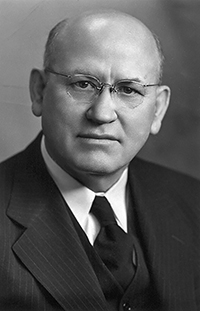 J. B. Chapman was nicknamed “Fireball Jimmy” in his early ministry, according to Paul Bassett. Forty years later, he was hailed more elegantly as “the Socrates of the Nazarene movement,” a tribute to his wisdom and common sense. The odd juxtaposition reflects Chapman’s growth, the evolution of his leadership style, and the estimation of a grateful church.
J. B. Chapman was nicknamed “Fireball Jimmy” in his early ministry, according to Paul Bassett. Forty years later, he was hailed more elegantly as “the Socrates of the Nazarene movement,” a tribute to his wisdom and common sense. The odd juxtaposition reflects Chapman’s growth, the evolution of his leadership style, and the estimation of a grateful church.
He began ministry at age 16 as a “boy evangelist” preaching across Texas and Oklahoma Territory. He was still an itinerant evangelistic preacher in the Chapman-Tetrick band when he met Maud Frederick. They married at Blossom, Texas, in 1903.
Marriage led him to settle down. He became a home mission pastor in Phillips and then Durant, Oklahoma Territory.
After that, he rose through church ranks, becoming college president, theology professor, Herald of Holiness editor, founding editor of The Preacher’s Magazine, undisputed father and champion of Nazarene Theological Seminary, and general superintendent. He developed a close affinity with H. Orton Wiley, and they shaped the structure and development of Nazarene higher education for over a generation. And he brought this personal history to the general superintendency from 1928 to 1947.
Chapman’s leadership style was grounded in his efforts for self-improvement. Maud had been a schoolteacher, and she took notes while he preached. Afterwards, she corrected his grammar and suggested other improvements in his oration. He credited her with improving his skill as both preacher and writer.
His appetite for books also made him a better preacher. Much of his work involved train travel, which provided study time. Paul Chapman, his youngest son, told me that his father began a trip with a briefcase full of books. It was usually empty when he returned home. He took notes on what he read, then gave the book away to some pastor so that others could benefit from it.

Chapman’s theological understanding also deepened over time. He earned his first degree at Arkansas Holiness College, graduating from the Greek-English Theology course while serving as pastor of the Vilonia, Arkansas, church. Upon graduating, he became the school’s president. In 1911, he entered Peniel University near Greenville, Texas, earning two more degrees and teaching theology. He continued teaching the class after becoming president of the school. The process of repeatedly working his way through theological texts for six years equipped him with a solid theological grounding for his later work as an editor.
Writing was one mean through which Chapman exercised leadership in the church. He was still living in Oklahoma when he began writing for The Holiness Evangel, the paper of the Holiness Church of Christ. Given responsibility for the home missions page, he filled it with advice, advocacy, and inspiration.
He became associate editor of Herald of Holiness in 1921 and senior editor in 1922. In 1926, he launched The Preacher’s Magazine, a monthly, which he edited until his death.

In his editorials, Chapman made a point of cleaving to the center, embracing and defending the liberty that Nazarenes allowed on eschatology, baptismal theology, and similar areas. For instance, he personally preferred immersion but argued that Nazarene pastors should baptize Christians according to the candidate’s preferred mode. If one could not do so in good conscience, then the pastor was morally obliged to arrange for another elder to perform the task.
Likewise, he was a premillennialist but defended the right of Nazarenes to embrace other millennial viewpoints. These inclusive principles were fundamental to the early Church of the Nazarene, and Chapman always defended the latitude granted to pastors and members.
Chapman’s wit and wisdom was appreciated by readers. Here is some of his advice:
- “The big job is not building sermons, but building preachers. . . The preacher is the substance of the sermon, even as the Word of God is its content, and it is the combining of the divine and human elements that constitute that preaching that God has ordained as His means of saving them that believe.”[1]
- “The idea that we should live on the defensive is a mistaken one. Preaching ‘against’ the heresies of the age will not meet the need.”[2]
- “Every preacher of full salvation should make John Wesley and his works a fundamental study.” [1]
Chapman took the initiative in founding Nazarene Theological Seminary. An advocate of graduate theological education since the 1920s, he pushed for a seminary at a meeting of the general and district superintendents in 1944, arguing that the church needed “more preachers and better preachers.” His dream was realized when the seminary opened the next year.
Chapman led the church in one other way. Hiram Reynolds had insisted that the general superintendency should be international in scope. His colleagues, Williams and Goodwin, did not see it that way, but Chapman did. He began international travel during his first quadrennium as a general superintendent and continued doing so until his death.
He died at Indian Lake Camp near Vicksburg, Michigan, in 1947, and was buried near there, close to his son Brilhart, who had died ten years earlier.
Dr. Stan Ingersol, Ph.D., is a church historian and former manager of the Nazarene Archives.
[1] J. B. Chapman, “The Substance of Preaching,” Preacher’s Magazine (Sep-Oct 1946): 4.
[2] Chapman, Herald of Holiness.
